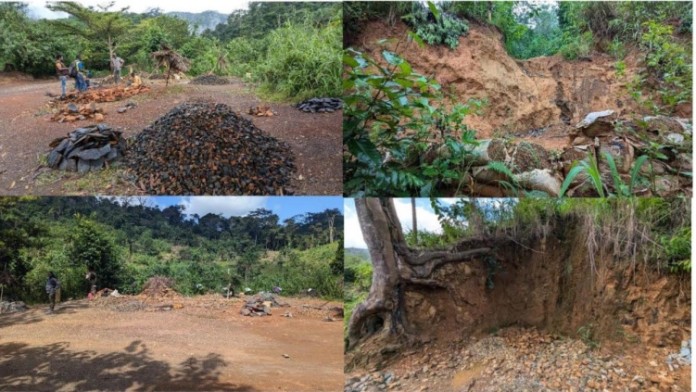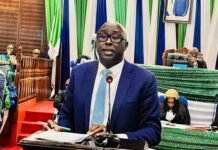By Amin Kef (Ranger)
Environmental degradation continues to be a major threat to Sierra Leone’s natural resources, particularly in areas such as the Kambui Hills, Western Area Peninsular National Park and other ecologically sensitive landscapes. The Sierra Leone Association of Journalists (SLAJ), in partnership with the Initiative for Media Development (iMDEV), has on November 5, 2024 concluded an intensive training program in Kenema to empower journalists and bloggers with the skills needed to effectively report on pressing environmental challenges facing the nation.
The five-day training, funded by the European Union (EU), brought together journalists from diverse media platforms to explore issues such as deforestation, artisanal and industrial mining and other activities threatening Sierra Leone’s biodiversity. Participants learned through workshops, expert-led discussions and field visits, gaining insights into the importance of environmental conservation and the role of community-led initiatives, such as those at Tiwai Island Wildlife Sanctuary.
Ahmed Sahid Nasralla, President of SLAJ, shared his concerns after witnessing the degradation firsthand, stating, “SLAJ is appalled by the level of environmental destruction observed at Kambui Hills and the absence of adequate oversight from relevant state authorities. This negligence robs future generations of their right to natural resources.”
SLAJ is therefore urging the Government of Sierra Leone to take decisive action. The Association calls for stricter enforcement of environmental laws, especially in regions like Kambui Hills, where unregulated activities are accelerating land degradation. SLAJ believes that implementing existing regulations is critical to halting further destruction and preserving the nation’s valuable natural resources.
The European Union’s support for this training aligns with its Multi-Annual Indicative Programme (MIP) 2021-2027, which prioritizes sustainable development and environmental protection in Sierra Leone. SLAJ extended its gratitude to the EU, emphasizing that the initiative underscores a shared commitment to raising awareness and advocating for sustainable practices.
SLAJ also commended the efforts of Tiwai Island Wildlife Sanctuary, managed by the Environmental Foundation for Africa (EFA) and the surrounding communities for their dedication to preserving biodiversity. This local initiative, SLAJ noted, is a powerful example of how community-driven conservation can combat climate change, protect ecosystems and provide economic benefits to nearby communities.
As this EU-supported training has concluded, SLAJ remains hopeful that the Government, partners and stakeholders will strengthen their support for environmental conservation. With continued collaboration, SLAJ envisions a future where Sierra Leone’s journalists can contribute meaningfully to environmental governance, advocating for sustainable development that benefits both nature and people.




